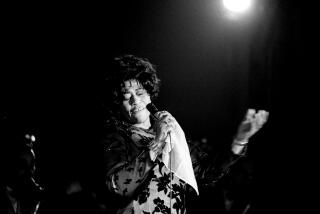Zeitlin Finds Harmony as Jazz Musician, Psychiatrist
- Share via
He is the jazz world’s most visible Renaissance man--a full-time practicing psychiatrist, a medical school teacher and a world-class jazz musician. Yet San Francisco’s Denny Zeitlin, a calm, collected and bearded vision of what a psychiatrist should be, doesn’t find his multiple-career life style all that remarkable.
“I’ve been involved with these activities since I was so young,” he said during a telephone conversation last week, “that it would be like cutting off part of my body not to do one of them.”
In fact, Zeitlin’s jazz performances, after an early burst of recordings and touring in the ‘60s and ‘70s, slacked off somewhat during the years he worked to establish his psychiatric practice. His public visibility brightened somewhat in 1987, with the release of a solo album, “Homecoming.”
A brief tour in support of Zeitlin’s new Windham Hill Jazz release, “Trio,” a more typically straight-ahead, jazz trio album, includes a rare Los Angeles engagement tonight through Saturday at Catalina Bar and Grill.
“I guess my public career has heated up recently,” he said. “But I’ve never really had a hiatus in my playing. When I came to San Francisco, I told myself I was going to practice psychiatry here and stay musically active as much as I could.
“By ‘active’ I really meant that I wanted to continue to feel I was growing and developing. As long as I feel that’s happening, that’s more important to me than the degree of the public nature of my music.
“I do want to continue to record, and I do want to continue performing, to make some kind of contribution to music that way. But all that pales beside the simple joy of playing the piano every day--to be able to go downstairs, sit at the Steinway and just attack it, musically.”
The curiously close connection between the medical profession and music is well attested to by the number of doctors’ orchestras throughout the country. Yet with the exception of trumpeter Dr. Eddie Henderson and an unknown number of physicians in amateur Dixieland bands, the jazz connection has been only slight.
Zeitlin, however, is convinced that his roles as psychiatrist and jazz musician have a deep, primal linkage.
“On one level,” he explained, “they’re very different activities. As a musician, I’m on stage, I’m in the spotlight, I’m performing, I’m apparently putting out energy. Other people are listening to what I’m doing, hopefully interacting internally, but they’re in a seemingly more passive role.
“In my psychiatric office, the roles are quite reversed. On the surface, they seem to be quite different. But I think that the common denominator of the two activities, the thing that is central to both activities, is communication. And that may explain why I was drawn to the two fields.”
Zeitlin feels that the need to generate a high degree of empathy is a further connective between psychiatry and jazz.
“You just can’t do either activity well--jazz or psychiatry,” he continued, “without developing a deep empathic capacity. Even if I’m playing on the stand without other musicians, I still have to be essentially in a merger state with the music in order for something even remotely artistic to happen.
“And similarly, if I’m working with a patient, I have to be able to enter their world in a completely genuine way in order to truly understand what they’re telling me. What I strive for is to try to attain that sort of merger experience in both activities.”
But the most important connection between psychiatry and jazz, concluded Zeitlin, “is that I think they’re both tremendously healing activities. I think it’s really in my being to want to help people--to want to enrich people’s lives to whatever small degree I might be able to do it.
“I certainly get that feeling after working for months or years with patients, and seeing them gradually turn their lives around. And I get that feeling after a concert when someone comes up to tell me they really were touched by what I played.
“Both those feelings, both those healing experiences, mean a lot to me. Because of them, I feel very grateful, very blessed, to be both a psychiatrist and a jazz musician.”
More to Read
The biggest entertainment stories
Get our big stories about Hollywood, film, television, music, arts, culture and more right in your inbox as soon as they publish.
You may occasionally receive promotional content from the Los Angeles Times.










